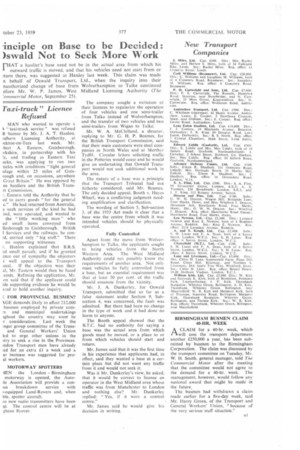ineiple on Base to be Decided: )swald Not to Seek More Work
Page 35

If you've noticed an error in this article please click here to report it so we can fix it.
CHAT a haulier's base need not be in the actual area from which his outward traffic is moved, and that his vehicles need not start from or :turn there, was suggested at Hanley last week. This claim was made n behalf of Oswald Transport, Ltd., when the inquiry into their nauthorized change of base from Wolverhampton to Talke continued efore Mr. W. P. James, West Midland Licensing Authority (The 'ommereial Motor, September 25).
The company sought a variation of their licences to regularize the operation of four vehicles and one semi-trailer from Talke instead of Wolverhampton, and the transfer of two vehicles and two semi-trailers from Wigan to Talke-.
Mr. W. A. McClelland, a director, replying to Mr. G. H. P. Beames, for the British Transport Commission, said that their main customers were steel companies in North Wales and at Merthyr Tydfil. Circular letters soliciting traffic in the Potteries would cease and he would give an undertaking that Oswald Transport would not seek additional work in the area.
The nature of a base was a principle that the Transport Tribunal had not hitherto considered, said Mr. Beames. The only decided appeal. Booth v. Hayes Wharf, was a conflicting judgment needing amplification and clarification.
The wording of Section 5, Sub-section 3, of the 1933 Act made it clear that a base was the centre from which it was intended vehicles should be physically operated.
Fully Controlled
Apart from the move from Wolverhampton to Talke, the applicants sought tri bring vehicles from the North Western Area. The West Midland Authority could not possibly know the requirements of another area. Not only must vehicles be fully controlled from a base, but an essential requirement was that at least 50 per cent, of the traffic should emanate from the vicinity.
Mr. J. A. Dunkerley, for Oswald Transport, submitted that so far as a false statement under Section 9. Subsection 4, was concerned, the fault was admitted. But there had been no change in the type of work and it had done no harm to anyone.
The Booth appeal showed that the R.T.C. had HO authority for saying a base was the actual area from which goods must be moved, or a place to or from which vehicles should start and return, Mr. James said that it was the first time in his experience that applicants had, in effect, said they wanted a base at a certain place but did not want any traffic from it and would not seek it.
Was it Mr. Dunkerley's view, he asked, that it would be correct to license an operator in the West Midland area whose traffic was from Manchester to London and nothing else? Mr. Dunkerley replied: " Yes, if it were a control centre."
Mr. James said he would give his decision in writing.
BIRMINGHAM BUSMEN CLAIM 40-HR. WEEK
A CLAIM for a 40-hr. week, which will cost the transport department another £250,000 a year, has been submitted by busmen to the Birmingham Corporation, The claim was discussed by the transport committee on Tuesday. Mr. W. H. Smith, general manager, told The Commercial Motor after the meeting that the committee would not agree to the demand for a 40-hr. week. The management, however, would follow any national award that might be made in the future,
The busmen had withdrawn a claim made earlier for a five-day week, said Mr. Harry Green, of the Transport and General Workers' Union, "because of the very serious 'staff situation."




































































































